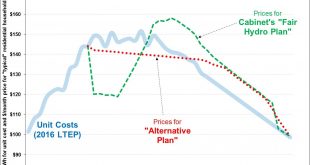Richard Florida’s new book, The New Urban Crisis (Basic Books, 2017) takes a careful look at rising inequality in big cities in the United States. He details the fact that many of the winners of today’s economy, the top 1% and top 10%, are located in a small number of “superstar” cities such as New York, Los Angeles, the Bay area, Washington and Boston where well paid jobs in higher education, finance, tech, higher education and entertainment are highly concentrated. These cities are...
Read More »Fiscal situation of Canada’s ‘oil rich’ provinces
I’ve just written a blog post about the fiscal situation of Canada’s ‘oil rich’ provinces (i.e., Alberta, Saskatchewan and Newfoundland and Labrador). It consists of a summary of key points raised at a PEF-sponsored panel at this year’s Annual Conference of the Canadian Economics Association. Points raised in the blog post include the following: -The price of oil is impossible to accurately predict, and there’s no guarantee it will rise to past levels. -Each of Canada’s ‘oil rich’ provinces...
Read More »Monitoring Program Performance in Calgary’s Homeless-Serving System of Care
I’ve just written a blog post discussing how program performance is monitored in Calgary’s Homeless-Serving System of Care. Points raised in the blog post include the following: -The Calgary Homeless Foundation (CHF) is the System Planner for Calgary’s Homeless-Serving System of Care (full disclosure: I work as CHF’s Director of Research and Data). As System Planner, CHF disburses approximately $42 million annually to programs in Calgary that assist households experiencing homelessness (I’ve...
Read More »A Post-Keynesian Summer School – TORONTO – June 23-25, 2017
The Review of Keynesian Economics and the Progressive Economic Forum are sponsoring a “Post-Keynesian Summer School”, to be held on the campus of the University of Toronto, June 23-25, 2017, and featuring leading post-Keynesian scholars from Canada, the US, and Europe. The summer school is aims at both undergraduate and graduate students, and registration is only $25 US per person, which includes all coffee breaks. In addition, Edward Elgar Publishers has graciously donated a number of...
Read More »Income Inequality Surged Under Harper
Just as Conservatives gathered to elect a new leader, Statistics Canada released income data for 2015. These allow us to look at trends under the full term of the Harper Government from 2006 to 2015. Average after tax income of economic families rose over this period – from $68,200 to $76,900 in inflation-adjusted dollars. But the gains were very unfairly distributed. The after tax income share of the top 10% of families and persons rose from 27.2% to 27.7% and that of the next 10% rose from...
Read More »Precarious work, Federal government edition
There was a recent article in the Hill Times about temporary workers in the federal public service, noting that this number is growing even under Trudeau’s sunny ways (that’s not entirely fair, the report only covered the first 5 months of the Liberal’s tenure). The numbers come from the Privy Council clerk’s annual report, which shows that the number of temporary and contract workers in the federal public service increased by 2,800 between March 2015 and March 2016, to 35,000 workers, or...
Read More »Ontario’s Electricity Sector III: Legislative & Finance Update
My January and April posts on the Ontario electricity sector described how decisions by different Ontario governments gave rise to excess electricity generation with an inflated cost structure, leading to higher electricity prices. Here I discuss the latest development, the Liberal Government of Ontario’s proposed financial framework for its “Fair Hydro Plan” (FHP). In election mode, the Government tabled Bill 132 on May 11, introducing a mechanism to finance the FHP, creating a 17% price...
Read More »NAFTA and Labour Rights
I recently spoke at the Standing Committee on International Trade on their study “Priorities of Canadian Stakeholders having an interest in Bilateral and Trilateral trade in North America, between Canada, United States and Mexico”. I share my notes with you here, although I did ad-lib a bit in the actual committee meeting. ********************** The labour movement is keenly aware that trade is, and always has been, an important feature of the Canadian economy. Many of our jobs depend on...
Read More »Ten things to know about social assistance in Canada
I’ve just written a blog post about social assistance in Canada. Points raised in the blog post include the following: -Social assistance has two contradictory objectives: 1) to give people enough money to live on; and 2) to not give people enough money to live on. -Very few immigrants receive social assistance (relative to the general population). -Several Canadian provinces have seen a rise in persons with disabilities receiving social assistance. -The inadequacy in social assistance...
Read More »POST-KEYNESIAN SUMMER SCHOOL – Toronto – June 23-25, 2017
The Review of Keynesian Economics (ROKE) and the Progressive Economic Forum (PEF) are hosting a: “Post-Keynesian Summer School”, on the campus of the University of Toronto, June 23-25, 2017. Over 2 and a half days, the summer school will introduce students to post-Keynesian economics, both theory and policy, and will feature some of the biggest names in post-Keynesian economics. Registration is only $50 US, and includes all coffee breaks and a reception. The school is open to both...
Read More » Progressive Economics Forum
Progressive Economics Forum

